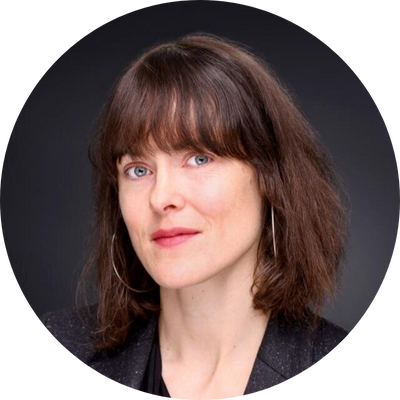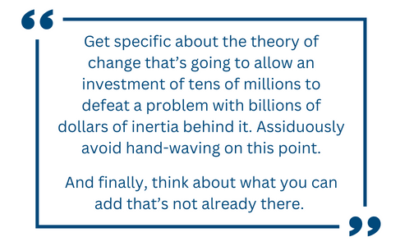An Interview with Chloe Cockburn of Just Impact Advisors

Chloe Cockburn, president of Just Impact Advisors
Recently, Aspen Institute Vice President and PSI Executive Director Jane Wales began to explore the role and potential of philanthropic “field strategists.” These strategists bring deep domain expertise, field insight, and trusted relationships to the philanthropic marketplace. Can they play a role to increase philanthropy’s efficiency and effectiveness? Can their ability to identify the biggest gaps and collaborate with people in the field help increase the impact of a donor or foundation’s grant portfolio?
One such field strategist is Chloe Cockburn, president of Just Impact Advisors, a grantmaking and donor advisory group devoted to ending mass incarceration and building autonomous political power of communities most impacted by incarceration.
Today, Wales and Cockburn discuss her work at Just Impact Advisors, her field strategist experience, and advice to professionals considering a similar role.
Tune in tomorrow for Chloe’s advice to philanthropists and foundations on engaging and leveraging a field strategist to maximize their giving impact.
*PSI has edited this interview for length.
Q. How did you get interested in criminal justice reform?
I come from a family of journalists. My parents reported on stories from around the world, often focusing on the humanitarian crises born of military intervention by the United States. They filmed devastation in Iraq after the first Gulf war, in Cambodia telling the truth about US support of the vicious Khmer Rouge regime, in Colombia investigating drug cartels, and more. By bringing these stories to audiences — on PBS Frontline, 60 Minutes, and other outlets – they instigated major changes in US policy.
I inherited this tradition of fighting for human rights. I learned how impactful it can be to combine fresh, on-the-ground information with access to power and resources. This took me to law school and into criminal justice work. After nearly 20 years of doing this work, I’m even more convinced that mass incarceration and mass criminalization have caused such devastating, generational destruction in the US that they constitute the largest human rights abuse in this country. To tackle this problem, I honed my skills as a civil rights attorney and policy expert at several organizations, including the American Civil Liberties Union, and formed deep relationships with directly impacted people organizing for change.
In 2015, I brought my practical experience to Open Philanthropy, where I directed grantmaking on criminal justice reform for more than 6 years. I moved a portfolio of over $150 million while also advising other donors on approximately $100 million in additional funds.
Q. What do you do now as president of Just Impact Advisors?
At Just Impact Advisors, we do four things, all focused on ending mass incarceration:
- Donor advising
- Donor education
- Field analysis and strategy
- Grantmaking from our social venture funds
We continuously hone and evolve a movement-oriented strategy informed both by theory and deep relationships and conversations with the country’s leading practitioners. We source the best opportunities using that strategy and make initial and follow-on investments. We synthesize information about field developments and share it with donors. We advise donors on impactful giving that meets their needs and advances the work. For donors who invest in our c3 and c4 social impact funds, we provide expertise and support on strategy, learning, grantmaking vehicles, and communications. Our team curates a learning and giving experience tailored to the donor’s interests.
I split my time between in-depth conversations with strategic leaders in the field and communicating what we have learned to donor investors who want to do the most good on the issue of ending mass incarceration. It is challenging, creative, and rewarding work.
Q. What have you learned that makes you more effective as a field strategist?
Here are a few of the practices I’ve adopted:
- I strive to know my field deeply so I can make smart early bets and understand what needs to grow. This requires forming deep relationships with people on the ground who are smart strategists, and being in sustained, substantive conversation with them.
- I read everything. I am constantly immersed in the expanding reporting and dialogue around current events in my field. Then, I synthesize my strategy and analysis of what is happening in my field one to two times a month to an audience of donors and changemakers. This helps me to incorporate my learnings with my investment decisions and those of other key donors. I have even written about the application of Bayes’ theorem to my work, and strive to produce a steady stream of analysis and structural planning for donors and leaders in the field.
- When going into a jurisdiction, it helps to have a clear picture of whose strategic vision I’m backing rather than assuming several organizations selected by me will figure out something. I’ve gone that route in cases where the issue directly impacts a leader who has deep roots in the community they are representing.
- I’m indebted to the Ayni Institute’s ‘movement ecology’ framework, which has helped me identify key gaps that funding can address. This helps me get away from comparing existing leaders and institutions to each other based on a broad metric of competence. Instead, I can think strategically about what types of work are likely to make a big change.
Q. What advice would you have for someone who is considering this role?
Working with multiple donors and raising money is like auditioning for films — most prospects will not work out. This work requires stamina, persistence, and passionate commitment to see it through. If you are not mission driven, there’s a danger of the practice devolving into transactional, small-ball work that is ultimately unsatisfying.

Someone in this role must be open to multiple approaches, not partisan to one theory of change. This requires forming a global view, including the ability to map the space and translate the map into strategy.
Put in the time to form deep and trusting relationships with leaders on the ground. This is how you get the best information and feedback on your strategy. It also will insulate you from serious mistakes and field backlash.
Get specific about the theory of change that’s going to allow an investment of tens of millions to defeat a problem with billions of dollars of inertia behind it. Assiduously avoid hand-waving on this point.
And finally, think about what you can add that’s not already there.
Q. How can philanthropists support intermediaries like Just Impact?
Different intermediaries have different structures. Some may require operations support, others funds for regranting, or a combination of the two. In our case, Just Impact’s operations are paid for. We run two social venture funds, one c3 and one c4. Donors that give to our funds leverage our deep knowledge and our agile, full-time operation. This ensures that needed dollars go to the most impactful work. Outside of our funds, we are active philanthropic advisors. We make one-off individual grant recommendations to donors when asked, we publish annual recommendations for small-grant giving to the field, and we create complete, bespoke portfolios for donors, foundations, and family offices who wish to deploy an impactful criminal justice strategy but lack the internal capacity to do so confidently.
